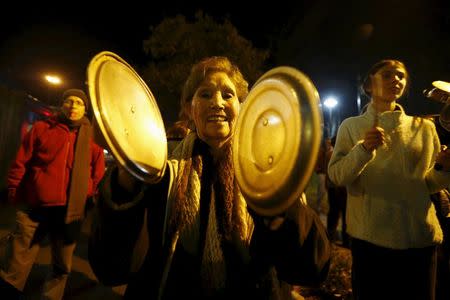Chileans spooked by crime, demand government action
By Gram Slattery SANTIAGO (Reuters) - Hundreds of Chileans took to the streets of affluent Santiago neighborhoods on Wednesday night, clanging kitchenware and waving banners to protest what they say is an explosion in crime in one of South America's safest nations. The "cacerolazo," as such protests are known in Latin America, was the latest in a series of demonstrations that reflect a dramatic rise in security fears among Chileans. In the past four days, anti-crime protestors have disrupted a meeting of ministers and judges and held rallies in Santiago's downtown plazas. Conservative lawmakers are campaigning to grant police broad emergency powers, including the right to demand proof of identification from citizens. "I lived in an area that used to be peaceful, and now I'm scared that someone will break into my home at any moment," said Lorena Diaz, a university administrator who attended an anti-crime protest in La Reina, a largely middle-class residential neighborhood in the Chilean capital. Organizers and police did not give official figures for how many attended the demonstration. A June survey by pollster Adimark showed that 86 percent of Chileans disapproved of the current government's performance on crime. But statistics indicate that crime has, in fact, fallen in the past year. According to police data, violent crime was down 2.6 percent in the first five months of 2015 compared with the year before. Property crime also dropped marginally, and United Nations statistics show Chile has the second lowest homicide rate in the Americas after Canada. "The current situation is obviously far more nuanced than the rhetoric," said Mauricio Duce, a law professor at Diego Portales University in Santiago, while scanning a table of recent crime statistics. Analysts say aggressive press coverage of violent incidents has helped fan worries, while opposition politicians, many of whom campaign on anti-crime platforms, also have whipped up anxieties by upping their rhetoric on the issue. "It's convenient for the opposition to focus on perceptions," said Kenneth Bunker, a Chile analyst at the London School of Economics. "Their argument is simple: the government has done a bad job." But crime-wary citizens and politicians say criminals have grown violent in ways that are not reflected in official data, pointing to anecdotal evidence and their own experiences. "I had a criminal break into my home and put a gun to my head. I'm lucky I'm still alive," said Diaz, the university administrator. "If it weren't a real issue, than why would we be out here?" (Reporting by Gram Slattery; Editing by Rosalba O'Brien and Paul Simao)




